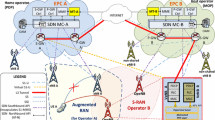Abstract
The increasing demand in personalized multimedia group services imposes stringent and heterogeneous requirements, which cannot be satisfactorily addressed through legacy architectures. In future scenarios, context-awareness and multicast will together drive new trends, since situations in which users share the same interests and request similar services can be exploit allowing efficient session/network control. However, context-awareness also introduce challenges, where any change to context, such as, location, mobility, velocity, preferences, presence, can change the overall services and network environments, thus requiring to dynamically restructure network and multicast sessions, which can pose scalability problems. In this paper, we propose an efficient architecture for context-aware multiparty session and network control which adapts to contexts’ and networks’ dynamics and maintains the connectivity with the expected requirements over session lifetime. In addition to dynamic session and network control driven by context, we introduce abstract trees to increase stability of network to any change. The practical scenarios studied in the paper demonstrate that such paradigm tends to be a very essential approach for the future Internet where unpredictable variables make the diverse users Quality of Experience (QoE) harder to satisfy.
Preview
Unable to display preview. Download preview PDF.
Similar content being viewed by others
References
Context Casting (C-CAST) project, EU’s ICT 7th Framework Programme, http://www.ict-ccast.eu
Neto, A., Cerqueira, E., Rissato, A., Monteiro, E., Mendes, P.: A Resource Reservation Protocol Supporting QoS-aware Multicast Trees for Next Generation Networks. In: 12th IEEE Symposium on Computers and Communications, Aveiro (2008)
Stewart, R.: Stream Control Transmission Protocol. IETF, RFC 4960 (2007)
Moskowitz, R., Nikander, P.: Host Identity Protocol (HIP) Architecture. IETF, RFC 4423 (2006)
Koundourakis, G., Axiotis, D.I., Theologou, M.: Network-based access selection in composite radio environments. In: IEEE Wireless Communications and Networking Conference 2007, Hong Kong (2007)
Liu, X., Li, V.O.K., Zhang, P.: NXG04-4: Joint radio resource management through vertical handoffs in 4G networks. In: IEEE Global Telecommunications Conference 2006, San Francisco (2006)
Ormond, O., Perry, P., Murphy, J.: Network selection decision in wireless heterogeneous networks. In: IEEE 16th International Symposium on Personal, Indoor and Mobile Radio Communications, Berlin (2005)
Taha, A.-E.M., Hassanein, H.S., Mouftah, H.T.: On robust allocation policies in wireless heterogeneous networks. In: First International Conference on Quality of Service in Heterogeneous Wired/Wireless Networks, Dallas (2004)
Braden, R., Estrin, D., Berson, S., Herzog, S., Zappala, D.: The Design of the RSVP Protocol. ISI Final Technical Report (1996)
Braden, R., Zhang, L., Berson, S., Herzog, S., Jamin, S.: Resource Reservation Protocol (RSVP) – Version 1 Functional Specification. IETF RFC 2205 (1997)
Kurokawa, A., Higashi, I.: Standardization Trends of the Next Generation Network in ETSI TISPAN. Journal NTT Technical Review 4(6), 53–57 (2006)
Estrin, D., Farinacci, D., Helmy, A., Thaler, D., Deering, S., Handley, M., Jacobson, V., Liu, C., Sharma, P., Wei, L.: Protocol Independent Multicast-Sparse Mode (PIM-SM): Protocol Specification. IETF RFC 2362 (1998)
Holbrook, H., Cain, B.: Source-Specific Multicast for IP. IETF RFC 4607 (2006)
Author information
Authors and Affiliations
Editor information
Editors and Affiliations
Rights and permissions
Copyright information
© 2009 Springer-Verlag Berlin Heidelberg
About this paper
Cite this paper
Neto, A., Sargento, S., Logota, E., Antoniou, J., Pinto, F. (2009). Multiparty Session and Network Resource Control in the Context Casting (C-CAST) Project. In: Mauthe, A., Zeadally, S., Cerqueira, E., Curado, M. (eds) Future Multimedia Networking. FMN 2009. Lecture Notes in Computer Science, vol 5630. Springer, Berlin, Heidelberg. https://doi.org/10.1007/978-3-642-02472-6_11
Download citation
DOI: https://doi.org/10.1007/978-3-642-02472-6_11
Publisher Name: Springer, Berlin, Heidelberg
Print ISBN: 978-3-642-02471-9
Online ISBN: 978-3-642-02472-6
eBook Packages: Computer ScienceComputer Science (R0)




